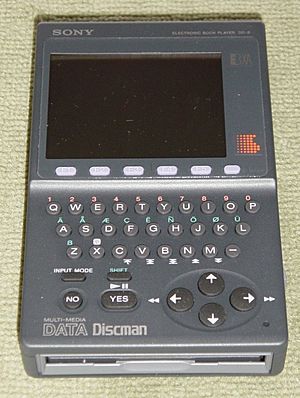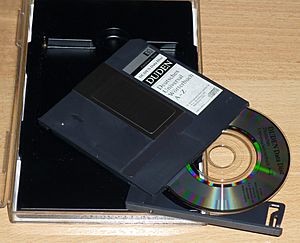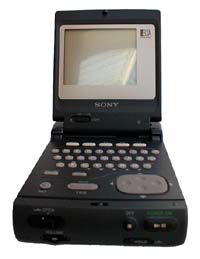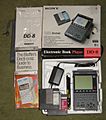Data Discman facts for kids
The Data Discman was an early type of electronic book player. It was made by Sony Corporation. This device first appeared in the Western world around 1991 or 1992. Sony tried to sell it to college students and people who traveled a lot in the United States. However, it was much more popular in Japan. The name "Discman" was already used by Sony for its portable CD players, like the Sony Discman D-50, which came out in 1984.
Contents
How the Data Discman Worked
The Data Discman let users quickly find information stored on special discs. You could search for things using a QWERTY keyboard. There were also "Yes" and "No" buttons to help you navigate.
What Was Inside?
Most Data Discman models had a small screen. This screen was a LCD and usually showed things in grayscale. The first screens were 256x200 pixels. Later models had better screens, up to 320x240 pixels, and some even showed color.
The device also had a CD drive. Some models used small Mini CDs, while others used full-sized CDs. The computer inside was not very powerful. Early versions of the Data Discman could not play regular audio CDs.
What Kind of Software Did It Use?
The software for the Data Discman came pre-recorded on discs. Most of these discs contained things like encyclopedias, dictionaries for different languages, and novels. Sony often used a special system called SEBAS (Sony Electronic Book Authoring System) to create this software.
Different Models of the Data Discman
The Data Discman came in a few different models over time.
The DD-1EX Model
One of the first models was the DD-1EX. This model is now part of the permanent collection at the Victoria and Albert Museum in London. You can see it displayed in their 20th Century Gallery. This early version could not play any sound.
The DD-10EX Model
An updated model, the DD-10EX, was released around 1992 or 1993. Unlike the DD-1EX, this newer model could also play audio files. The British version of the DD-10EX came with two discs. One disc had the Thomson Electronic Directory from April 1992. The other disc had a Pocket Interpreter 5-language conversation book for travelers.
The DD-10EX was also shown in an exhibition at the Victoria and Albert Museum in 1995. This exhibition was called The Book and Beyond: Electronic Publishing and the Art of the Book. Another item shown there was a CD-ROM for the Data Discman called The Library of the Future, which came out in 1993.
Design Changes
The DD-1EX and DD-10EX models both had a "flip" or "clamshell" design. This means they folded open and closed, similar to a compact makeup case. However, a later model, the DD-8, had a flat, rectangular design. This design was more like modern e-book readers, such as the Amazon Kindle.
Learn More
Images for kids
 | James Van Der Zee |
 | Alma Thomas |
 | Ellis Wilson |
 | Margaret Taylor-Burroughs |





